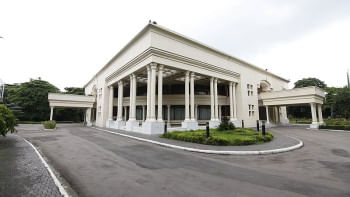Broadcasting: People's voice
Broadcasting media is perhaps the most powerful communication means to impact our everyday life, culture, behavioural patterns to countless other things. Thus, it needs a policy to promote and protect our culture, heritage and values as well as to secure our socio-political-economic interests. As Bangladesh races to get its first broadcasting policy -- one can only become a sceptic. Why? Since the broadcasting policy does not clearly underpin who will decide the broadcasting topic? It says every broadcast medium has to formulate a 'specific' editorial policy in light of the Broadcast Policy -- suggesting restrictions in subjects and scope for constructive criticism. Moreover, it needs to be clarified what type of contents will be considered as “anti-state and conflicting with public interest.”
Isn't that enough to be sceptical about the policy? True, that unlike any of the previous regimes the AL government have been more specific in terms of formulating a comprehensive broadcasting policy, but not without a number of loopholes in it.
As the draft is about to be sent to the cabinet for approval, we expect to see the cabinet acting judiciously -- solely based on defending democratic values. However, it's the timing that has caught our attention. Though the government had dropped hints about forming such a policy long ago but the process was moving at a snail's pace. And all of a sudden, in the wake of controversial news reports, closing down of a paper was followed by a number of journalists being arrested -- the process got quickened. The finalised draft of the policy was rushed with such amazing speed that even the PM had to express her discontent as she was not consulted prior to it being finalised. Scuttling over the draft is clear indication of an over-reactive government. From another side, we would also expect our main opposition at the parliament to take a responsible undertaking when the policy arrives as a bill to be passed.
Awami League's last two manifestos focused on media and information rights. For public benefit, the AL-led government even retained a number of policies and ordinances promulgated by the last caretaker government. For instance: “Community Radio Policy 2008' and “Right to Information Act (RTIA) 2009” were among those laws that the current government, during its last tenure, endorsed as good policies, aside from implementing the 8th wage board for journalists. It is true that private channel talk-shows have never seemed livelier, bold and informative.
If, however, the broadcasting policy 2014 turns out to be a one to serve political purposes, then we fear that AL's past achievements will get concealed and then soon forgotten.
The writer is Current Affairs Analyst, The Daily Star.

 For all latest news, follow The Daily Star's Google News channel.
For all latest news, follow The Daily Star's Google News channel. 



Comments